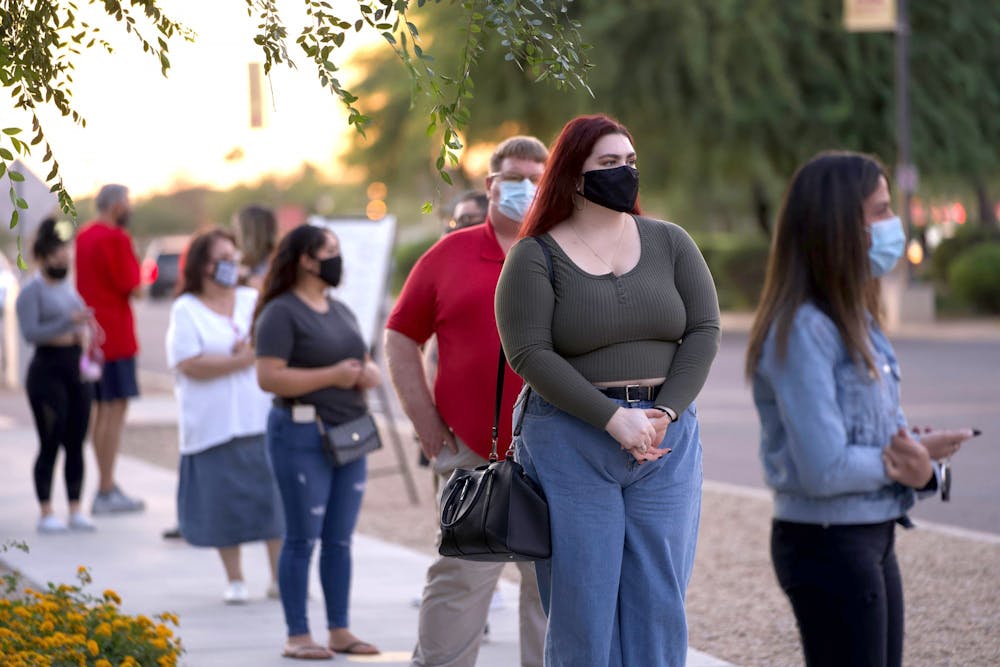Leading into Election Day, officials and voters across Arizona were wary of potential issues at polling places, including concerns of voter intimidation as a result of heightened political tensions.
By late morning on Tuesday, Osman Erives, a volunteer with Election Protection Coalition of Arizona and freshman studying digital and integrated marketing communications, said it was business as usual at the ASU West campus polling station.
"Thankfully, we really just have like a calm day of people just trying to get their vote in and trying to make their voices heard," Erives said.
Election Protection Arizona is a non-partisan group of volunteers who were at the West campus and other polling locations in the state to provide support to voters experiencing issues at polling locations.
On Monday, Secretary of State Katie Hobbs tweeted a "Voter Intimidation Prevention Guide," adding that "voter intimidation is unlawful" and voters should "know your rights" before heading to the polls.
Nuvia Enriquez, communication director for Election Protection Arizona, said they were aware of roughly 200 reported incidents across the state from voters, but nothing "systemic."
"By making some quick phone calls to election officials or having our volunteers just go in (polling stations) directly and ask for additional help for voters, things were able to be solved very quickly across the state," Enriquez said.
According to a spokesperson for the ASU Police Department, other than a "brief line ... during the evening rush" at the West campus, Election Day "went smoothly" for ASU.
At the West campus, the line reached around a 50 minute wait, leading a county reporter to direct voters to nearby locations with shorter wait times.
While those helping at ASU's on-campus polling locations reported few incidents, Torey Dolan said the ASU Indian Legal Clinic and its Arizona Native Vote Election Protection Project had reports from those voting on reservations of difficulties at polls throughout Arizona.
Dolan, a Native vote law fellow with ASU's Indian Legal Program, said hundreds of reports they received throughout the day ranged from voter confusion regarding voting precincts to waiting voters being pulled from lines, despite arriving before the 7 p.m. deadline.
READ MORE: Indigenous voters are facing barriers in upcoming general election
Dolan said one report claimed a poll marshal "told people originally that they needed to be inside the building in order to be considered in line at 7 p.m."
"That's not true," Dolan said. "The line can wrap around the building five times — as long as you are in the line by 7 p.m., you can vote."
In Arizona, marshals are meant to "preserve order at the polls," including monitoring wait times and announcing the closing of the polls.
Dolan said voters also reported armed police officers in tactical gear patrolling polling stations in multiple counties.
According to the Arizona Secretary of State's website, uniformed or plain-clothes law enforcement officers "should not be stationed within the 75-foot limit of a voting location," unless they are responding to a specific emergency or if the voting locations is in a "public safety building."
"When (police) linger around a polling location, that in and of itself can be intimidating," Dolan said.
The Secretary of State's website notes even outside of the 75-foot limit, "the presence of uniformed law enforcement personnel at a voting location ... may have the effect of intimidating voters."
Overall, the biggest change to Election Day at ASU this year was the reduced number of people voting in person and other noticeable consequences of the COVID-19 pandemic.
READ MORE: Early voting contributes to relaxed atmosphere on Tempe campus
"Today was a very smooth day for elections in Arizona," said Randy Perez, the democracy director for the Arizona Center for Empowerment. "I'm really proud of our elections officials."
State Press photographer Angelina Steel contributed to the reporting of this article.
Reach the reporter at kpirehpo@asu.edu and follow @kevinpirehpour on Twitter.
Like The State Press on Facebook and follow @statepress on Twitter.




